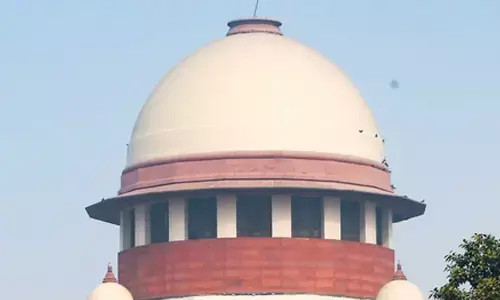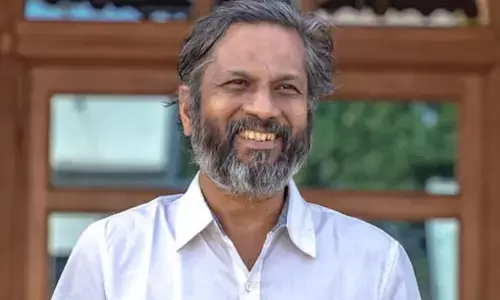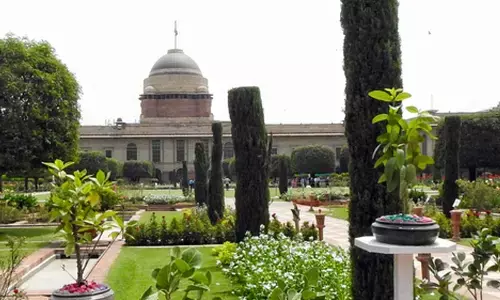Come down hard on hardcore anti-nationals!

Come down hard on hardcore anti-nationals!
Once again, the focus of nation-wide debate is on IPC section 124-A (offence of sedition).
Once again, the focus of nation-wide debate is on IPC section 124-A (offence of sedition). While not necessarily the views of the Union government, the Attorney General KK Venugopal has opined that the said section is a good law and should be retained in the law book. The lobby opposed to this section insists that it is a legacy of British Raj era and therefore, should be scrapped forthwith. There are also voices which favour the retention of the harsh legal provision but with a rider that the Centre should frame guidelines making it clear as to what is permissible and what is impermissible under the sedition law.
Now that the ball is in the Supreme Court, the ongoing debate on sedition law is expected to be instant and meaningful. Going by the prevailing scenario in the country it would be suicidal to do away with the provision for the offence of the sedition. Though termed as 'draconian' altogether, on the other hand, it is equally true that in order to avenge the political losses of the past ruling powers that be, are prone to misuse the provision of law of sedition against rivals. Certainly, this is condemnable. At the same time, in order to sanitise the society from anti-national elements who are hell-bent upon tarnishing the very fabric of the society, the provision of sedition in the law book deserves to be retained for its sparing use as a "last resort".
The governments in a democratic setup, come and go; but the nation survives. This indeed, the logic behind the argument that a harsh provision for dealing with the offence of sedition should be retained. However, necessary guidelines may be framed to ensure that this harsh provision is not misused by the government of the day. Therefore, a full-proof mechanism must be provided by amending the Sedition Law suitably.
The protagonists for the repeal of section in IPC cite Articles 14, 19(1)(a) and 21 of the Constitution in support of their plea. On the other hand, those who are in favour of retaining the sedition law refer to the 1962 Judgment of the Supreme Court which concluded that section 124-A of IPC does not come in the way of the Constitutional guarantee of freedom of expression.
Indeed, it is to be understood that the laws are made not only for present but also keeping the foreseeable future in mind. It is also true that as and when the situation requires all laws can be reviewed, amended, added, varied or repealed to suit the socio- economic and political demands of the time. Therefore, let there be clarity of purpose and let there be a sincere and dedicated attempt to mould the crucial law of sedition which can only be used against hardcore , incorrigible and anti-national elements and nip such elements in the bud itself before they assume monstrous proportion.
COMMUTATION OF DEATH SENTENCE; REVIEW SOUGHT
The review petition against the Supreme Court's judgment of April 19 commuting the death penalty of a man convicted for rape and murder of a 4 -year-old girl has been filed by the mother of the victim.
The said judgment has stirred the nation with a debate as to the propriety of the decision of the apex court in converting the capital punishment to life imprisonment of a death-row convict on the spacious argument that 'every sinner has a future' which is nothing short of an utopian or at best, a literary jargon devised by an English author Oscar Wilde. The mother's plea for review, submitted to the Apex court through her Counsel, said: "it is most respectfully submitted that the petitioner's three years and eight months old innocent daughter also had a future, however, she was deceitfully kidnapped, brutally raped and viciously murdered by the Respondent No.2/accused in the most brutal, diabolic, cruel, depraved and gruesome manner." The petition further says that the punishment before all things must be befitting the nature of crime and deterrent with an explicit aim to make an example out of the evil-doer and a warning to those who are still innocent.
It remains to be seen if the Apex court would reconsider its verdict or stick to its pronounced verdict of following the Oscar Wilde's sermon.
ACCUSED CAN'T BE SUMMONED ORALLY TO PS
The Lucknow bench of Allahabad High court has held that no person can be summoned orally to visit a police station on the ground that his physical presence is required in an investigation. The division Bench comprising Justice Arvind Kumar Mishra and Justice Manish Mathur in judgement pronounced on May 4 also directed the state government to ensure that no person, including an accused is summoned to a police station orally by subordinate police officials without the consent of the station in-charge. The proper course of action as prescribed under the Criminal Procedure Code is to serve a written notice upon such a person, but only after a case has been registered, the Bench added and emphasised that a person's life, liberty and dignity cannot be jeopardised based solely on the verbal orders.
LAB FINED FOR WRONG DIAGNOSIS
The Hyderabad Consumer Disputes Redressal Commission-3 has granted a compensation of Rs 1 lakh and refund of medical bills amounting to Rs 1 lakh to a complainant for wrong Creatinine- level reports by a diagnostic centre . The complainant, B Janardhan Goud had stated in his complaint that he is a diabetic patient with kidney problem. He had undergone a creatinine test at the said Diagnostic Centre at Dilskunagar 3 times and had three different reports. The complainant added that on seeing the creatinine test reports the doctors advised him to undergo the same test once again before opting for an Angiogram. As the last creatinine report showed the creatinine level of 2.6, his Angiogram was cancelled. The complainant alleged he suffered huge loss, mental shock, pain and agony. The commission was not convinced of the defence put forth by the diagnostic centre and found that the reports of creatinine level were wrong which amounted to deficiency in service.
BAI GCM HELD
The General Council meeting of the Bar Association of India (BAI), the pioneer all India organisation of legal fraternity in the country was held on May 2 at New Delhi. Supreme Court Judge, Justice Indira Banerji was the Chief Guest at the event presided over by Prashant Kumar, the President of BAI. Bar leaders , law officers and ex-officio legal luminaries throughout the country participated in this annual event.
















